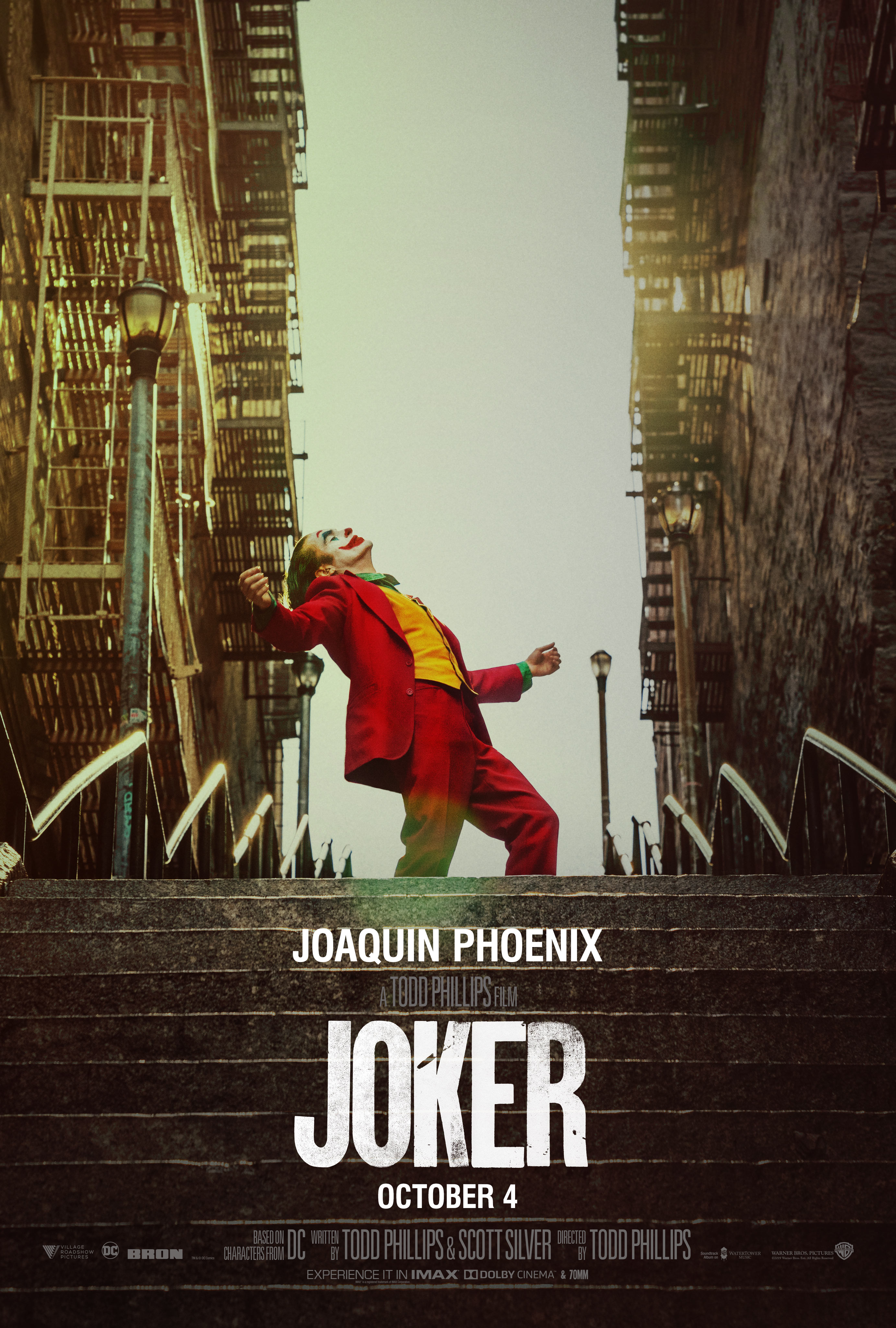JOKER Review
By Jake Hardison

The New York Times calls it uninteresting. CNN is convinced it will inspire violence. The truth about JOKER, as you would imagine, is somewhere in between.
Only halfway into its debut weekend, the standalone villain origin from Warner Bros and DC has already broken at least two box office records, and is expected to beat last year’s Venom for the largest October opening of all time. Some of the film’s early mainstream success can be credited to its stellar festival run. Last month director Todd Phillips and crew took home a Golden Lion, the top prize at the Venice Film Festival, for JOKER. The previous two recipients of the award were The Shape of Water and Roma , both of which were subsequently nominated for best picture at the 90th and 91st Academy Awards (respectively), the former winning.
However, the previous months also saw JOKER inadvertently receiving what can be thought of as a viral marketing campaign generously done on the film’s behalf, totally free of cost to Warner Bros. After the release of the second trailer, the blue checkmark brigade of Woke Twitter sounded off to facilitate a self-containing echo-chamber, with slightly different variables of the same response: that the movie seemingly glorifies the mass violence caused by a disenfranchised white male incel, and that there was a possibility for real-world consequences. For most fans of the character, the comic books, or just any movie that displays violence, this was obvious nonsense. However, as part of standard operating procedure, news outlets all over the country estimated the loudest voices of social media to represent a sizeable chunk of the population, and thus controversy was born. As if the over-magnified hot takes weren’t bad enough, much of the reporting on said “controversy” included reflecting on the 2012 mass shooting that took place in an Aurora Colorado theater’s screening of The Dark Knight Rises. While it is notable that the theater has opted not to screen JOKER, many reputable sources continue to repeat the lie that the shooter was dressed as the Joker, and therefore inspired by the character. What’s more is that at one point in JOKER’s press tour, the film’s lead, Joaquin Phoenix, even walked out of an interview when questioned on the possibility of the film inspiring those who might empathize with the character to commit acts of violence.
This being said, I myself may have adopted some version of this reasoning at one point. While I never thought that an origin story empathizing with the Clown Prince of Crime should be held accountable for the possibility of violence, I personally found the concept a little…lame. In fairness the best villains are usually three-dimensional, being the heroes of their own stories, and often having arcs and sometime even redemptions. However, I always thought that what made the Joker great, especially in film, was that he represented something more chaotic, driven by nothing more than an obsession with Batman and a need to cause anarchy. In most portrayals, just when we think we’re starting to learn about the Joker, he reveals himself to even more insane and less human than we thought. When asked about his goals, Jack Nicholson’s version says that he wants his face on the one-dollar bill. When explaining how he got the scars on his face, Heath Ledger’s Joker gives us multiple different stories, presumably lies. That’s probably enough examples of recent onscreen Jokers, right?
My point is, what we get from Todd Phillips and Joaquin Phoenix is ultimately enough to silence any of this trepidation. I was lucky enough to see JOKER in IMAX opening night. I thought I would write my review immediately after, but when I left the theater there was a lot I had to let myself sit with. I really had to think about what the point of the movie was, what commentary it was making, stances it took, etc. While I will try to keep this spoiler-free, the result is that JOKER is nothing short of a masterpiece.
Yes, it will make you want to ask questions about things like mental illness, media, class warfare, and the responsibility of your fellow citizens and your government. But it doesn’t act like it has the answers, nor does it pretend that those questions are even the most important part of the movie. More than anything, JOKER is the brilliantly-told story of a man who starts out damaged and becomes irredeemable. Joaquin Phoenix exceeds even his already high expectations as performer, becoming almost completely indistinguishable from Arthur Fleck, a mentally ill loner, and the story’s unreliable narrator. Todd Phillips proves himself as master filmmaker, illustrating Arthur’s rise as a legitimately terrifying villain.
The biggest testament to both the storytelling as well as Phoenix’s performance is the fact that almost 100% of the film is devoted to Arthur. That is, Phoenix is literally on screen for almost the whole movie. It seems like the film never goes more than 20 or 30 seconds without having the main character in the frame for the entire runtime, up until the credits. Yet, if you’re wondering about the story’s tendency to get you to sympathize with Arthur, the truth is that from the beginning you feel sorry for anyone in the same room as him.
Arthur Fleck is clown for hire, contracted by clients ranging from thrift stores needing a mascot to spin a sign, to children’s hospitals looking for a colorful character to cheer up ailing kids. He lives in a version of Gotham that feels more real than any we’ve seen so far, and furthermore, one that seems to hate him. He faces several all degrees of cruelty and indifference from his fellow citizens, his boss, and even his mother. You’ve likely already heard that the film borrows heavily from Martin Scorsese’s Taxi Driver and The King of Comedy. These are both clear inspirations, however neither are sufficient warnings of how disturbingly grounded and real the depiction of mental illness is in JOKER. Arthur suffers from several different afflictions, however not all of them are immediately apparent. His condition is viscerally believable, and you can never be sure how he will react to his surroundings. The only thing that you can be sure of is that you will spend most of the movie completely uneasy, cringing in your seat. Every moment of tension is effectively built, and the film earns every subsequent payoff, of genuine dread.
In conclusion, I loved JOKER. Though the film has no franchise prospects, and we likely will not see this version of the character again, Joaquin Phoenix’s performance will undoubtedly become historic as well as a fan favorite. Hardcore fans will love the film, and so will casual audiences. We should all thank Woke Twitter, cancel culture, and mainstream entertainment reporting for helping promote this work of art, and look forward to whatever they bring us next.

